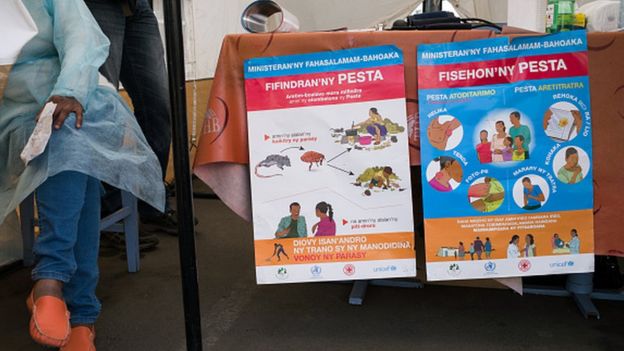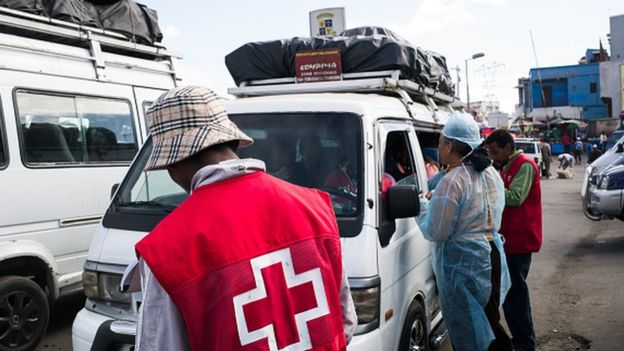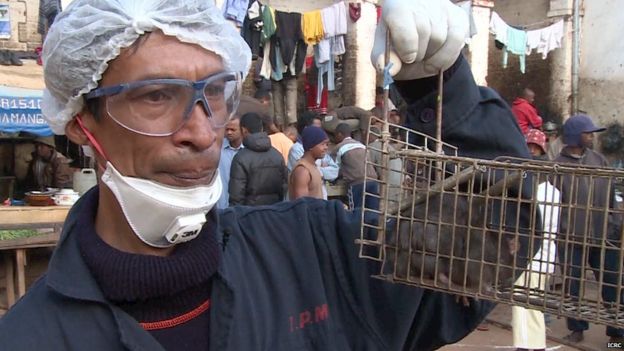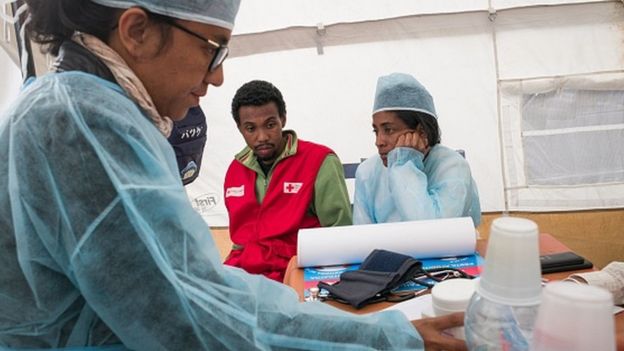More than a million doses of antibiotics have been delivered by the World Health Organization to fight an outbreak of plague in Madagascar which has killed at least 33 people.
The authorities have also banned prison visits in the two worst affected areas to prevent the spread of the disease.
The risk of contamination is high in overcrowded and unsanitary jails.
There has recently been criticism of the government's perceived slow reaction to the outbreak.
The health ministry says the latest bout of plague has infected about 230 people - in addition to those who have died - in just two months. There are normally about 400 cases of plague every year in the country.


This year however the majority of cases are of pneumonic plague, which affects the lungs and is transmitted through coughing. It is considered to be the most deadly form of the disease and can be fatal within 24 hours.
The less deadly bubonic plague is often spread by rodents fleeing forest fires. Humans usually become ill after being bitten by infected fleas.
Public gatherings have been banned in response to the latest outbreak.
A specialised hospital in the capital Antananarivo is struggling to cope with the influx of ill people, local media reported, with long queues outside for face masks and medicine.
This year urban areas have been affected, a development that has worried aid agencies in a country not renowned for a robust healthcare system.
"Plague is curable if detected in time. Our teams are working to ensure that everyone at risk has access to protection and treatment. The faster we move, the more lives we save," WHO Madagascar Representative Charlotte Ndiaye said in a statement.
When did the latest outbreak begin?
It is unclear when the disease first broke out but the first death occurred on 28 August when a passenger died in a public service vehicle in the town of Moramanga, on the east coast.
Two others persons who came had come into contact with the passenger later died, with two more succumbing to the disease in the centre of the island.
A Seychellois basketball coach died in a hospital in Antananarivo on 27 September during the Indian Ocean Basketball Championship.
Which areas are affected?

Two regions are particularly hit by the outbreak. The first is in eastern Madagascar - where the first death was recorded on 28 August - and the other is the central part of the island, mainly in Antananarivo.
"The risk of the disease spreading is high at national level... because it is present in several towns and this is just the start of the outbreak," a WHO official said.
How has the government reacted?
On 30 September, Prime Minister Olivier Mahafaly Solonandrasana in a televised statement announced that all public gatherings would be banned in Antananarivo to prevent the spread of the disease following the death of the basketball coach.
In addition to school closures across the country, authorities on 5 October ordered the closure of the country's two main universities in the eastern port of Toamasina and Antananarivo for disinfection purposes. Sports events have also been cancelled.
What else is being done to curtail the plague?

There have been concerted efforts to set up rat traps and spray insecticides in several neighbourhoods to prevent the spread of the disease. The government has also established a toll-free number to report any new cases.
The Ministry of Health in addition has also taken measures against social media users who it accuses of spreading "false news" on the disease to create panic. A Facebook user was arrested and investigated on 3 October for publishing a report which did not correspond to the toll given by the ministry.
What has been the reaction within the region?
The Ministry of Health in Seychelles has advised airlines and travel agencies to discourage people from travelling to Madagascar due to the outbreak. The authorities have also put screening measures in place at the country's main airport.
On 6 October, Seychelles' national carrier announced that it had "temporarily suspended" its flights to Madagascar. Several Malagasy nationals live and work in the Seychelles in various sectors and frequently travel between the two islands.
Latest Stories
-
Immigration judge says Columbia University student Mahmoud Khalil can be deported
4 hours -
Kenya: Opposition tells Prez Ruto- You are no Kibaki
4 hours -
Uganda and Zimbabwe open Rugby Africa Women’s Cup Division One with wins
5 hours -
Why Salah turned down ‘£500m Saudi move’ for Liverpool stay
5 hours -
I died, went to heaven but God sent me back – Actress Doris Ogala
5 hours -
‘I am not intimidated’ – Rev. Ntim Fordjour breaks silence after botched arrest attempt
5 hours -
NPP will be better if the ‘demons’ are evicted from the party – Prof Frimpong-Boateng
5 hours -
Maison Yusif Fragrance makes history with ‘The Apex’ – Africa’s best selling niche fragrance
7 hours -
Braye hits hat-trick as Medeama beats Dreams FC 4-0
8 hours -
Electricity tariffs up by 14.75%, water by 4.02% in latest review
8 hours -
Francophonie Festival 2025: A celebration of education and culture
8 hours -
Most Ghanaians are like single-phased wires -Prof. Akosa
9 hours -
GUBA leads historic Memphis-Ghana Trade Mission, paving the way for diaspora investment
9 hours -
KNUST declares 2 former students persona non grata over indiscipline, campus disturbances
9 hours -
IGP clarifies comments on recruitment of Bawku youth into the police service
9 hours

